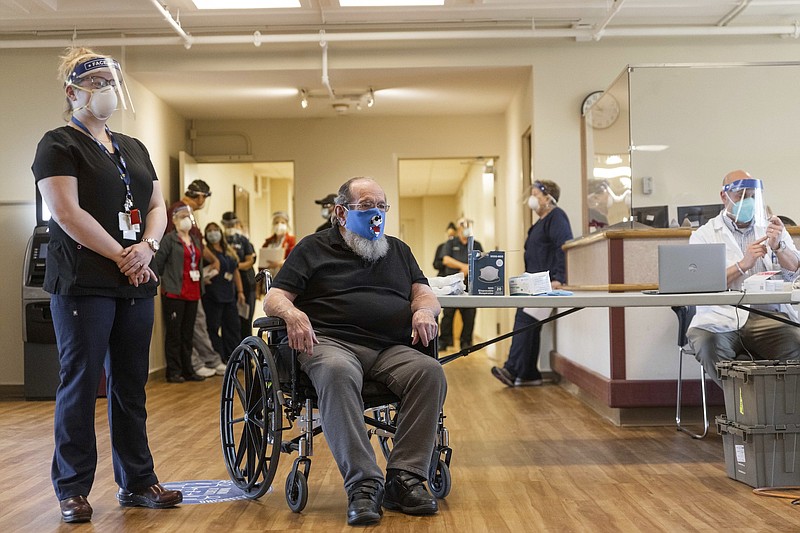As this dismal year draws to a close, we fix our eyes on images of rescue: A vaccine. An inauguration. A spring that might bring reopenings instead of shutdowns. May we once again see crowded restaurants, empty hospital beds, peaceful streets, kind faces. May these stark past months be long forgot and never brought to mind.
Yet we cannot, despite ourselves, leave this cruel year behind. The 340,000 dead from COVID-19 won't let us, nor will the lingering animosity we display toward one another, expressed by the masked toward the unmasked and the other way around, or by plots to kidnap governors and put them on trial, or angry chants outside the homes of police chiefs, mayors and public health officers. Nor can we seem to let go of this year's presidential election, which is over and clearly decided, yet somehow for many not ended? How far into next year will the denial extend? Jan. 6? Jan. 20? This year is like some irritant in the eye that can't be washed out. It stays with us, affecting our vision in a most unexpected way - clarifying it, not clouding it.
That's the thing about 2020, a term that describes both normal eyesight and an abnormal year. 2020 vision has given us a partially corrected view of ourselves, our nation and one another. It has brought into focus some hard truths that we cannot now unsee, try as we might.
We formerly saw America as being at the apex of medical knowledge and logistical know-how, the most prepared nation to deal with contagious diseases. We had protocols. We had plans. We had the equipment and the skills, the scientific expertise, the civilian chain of command and the requisite confidence in our government. We proved that with Ebola and avian flu. We were ready.
But in fact we were not.
The protocols, plans and principles developed by the Obama administration for dealing with a pandemic were thrown out by the current team and replaced with essentially nothing - except for a hazy notion that each state would provide its own response and somehow block the disease at the state line. Officials of both parties share blame.
We gazed with sympathy at Italy when it ran out of hospital beds amid a COVID-19 crisis in March, and we wondered at how such an advanced nation could be caught so off-guard. We thanked our lucky stars we weren't like them - yet here we are, with by far the world's worst pandemic body count.
The crisis weighed Americans' regard for one another and found it wanting. Would we wear masks to protect one another's lives? Would we do without restaurant meals, family gatherings, political rallies, worship services, at least to protect our friends and loved ones, if not ourselves? Would we do it to beat back the greatest collective challenge the nation has faced in generations?
We would, for a while, and then we would not.
For all our expertise and resources, 2020 has revealed the stark inequalities, eroded solidarity and sheer selfishness that have long been in the background, the result of decades of attacks on government, on the safety net and on the very idea of a shared American destiny. It presented our nation, our society, our form of government and our collective will with a rigorous stress test. We failed.
Already imperiled by a deadly pandemic and economic collapse, we saw a Black man killed when a police officer knelt on his neck for some eight minutes. Some sighed and said we'd seen it before; others took to the streets in anguish, outrage and resolve. A nation half-believing that racism was long defeated and half-angry that racism still pumps vigorously through our veins confronted itself, and still cannot reach resolution. Could we at least agree on the scope of our progress - and failure? We could not. Could we at least relegate racist speech and behavior to a less-enlightened era, or to a few backward corners of our nation, or to the ignorant or malicious people who dress in blackface for what they consider fun, or who call the cops when they see a Black man on the street, minding his own business? We could not.
This year also exposed the fragility of the economic expansion of the last decade, ostensibly the longest in American history. Real wages have scarcely risen in decades, and the presumed abundance of our times - online commerce, cheap consumer goods from China, numerous digital gadgets to entertain and distract us - covered up glaring economic insecurity.
Truth came under attack in 2020. We doubted one another's ability to differentiate fact from fiction. Science was questioned - indeed, even the scientific method, and the belief in empirical reality. We are not who we thought we were.
Much as 2020 was largely defined by a legacy of 2019 - recall, after all, that the "19" in COVID-19 refers to the year the disease was first identified - so 2021 will carry with it pieces of 2020. We still have the pandemic. We are at a crossroads on race and policing with little consensus on a path forward.
But a new year is a time of renewal nonetheless, and if it brings with it some measure of American disillusionment, that's not necessarily a bad thing. A clearer vision of ourselves and the chasm between who we are and what we aspire to be is necessary to any improvement. If we can name our shortcomings, surely we can fix them. The least we can do is try.
The Los Angeles Times
